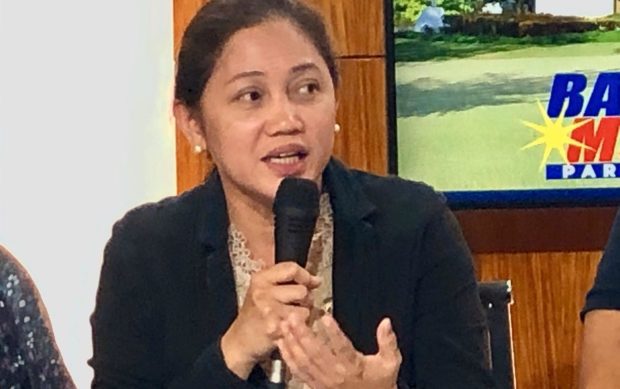Brosas to Lacson: Red-tagging increased after passage of Anti-Terror Law

Gabriela Rep. Arlene Brosas during the weekly press briefing at the House of Representatives held on Nov 21, 2019. INQUIRER.net file photo / Noy Morcoso
MANILA, Philippines — For Gabriela Rep. Arlene Brosas, the state security forces’ red-tagging and terrorist-tagging were ramped up with the passage of the controversial Anti-Terror Law.
This was stated in Brosas’ letter to Senator Panfilo Lacson, the principal author of the controversial measure, on Tuesday where she expressed that she will not be participating in the Senate committee hearing concerning the recent incidents of red-tagging of celebrities and lawmakers.
Lacson is the chairperson of the Senate committee on national defense and security, peace, unification and reconciliation that is heading the hearing.
“Such intensified red-tagging and terrorist-tagging by state forces only affirms our strong objections to the Anti-Terror Law, as these expose how anyone can be loosely labeled as ‘terrorists’ and be potentially punished under the draconian terms of the new law,” Brosas said.
“If anything, this latest incident should prompt both Houses to revisit the Anti-Terror Law and consider the growing clamor for the scrapping of the measure,” she added.
Article continues after this advertisementIn the same letter, Brosas insisted that Gabriela Women’s Party is not an armed group, saying that the party-list “is the only women’s party not only in the Philippines but in the world with a representation in parliament that is a product of women’s collective action.”
Article continues after this advertisement“The state security forces’ red-tagging and terrorist-tagging spree, which were ramped up with the passage of the Anti-Terror Law, did not stop us to continue with our legislative work amid pandemic – we filed House Bill 7909 or the Pandemic Leave Bill which grants 14 days of paid additional leave at full pay for COVID-19-exposed workers and the comprehensive pandemic response bill known as SHIELD Bill,” Brosas said.
Even before the anti-terror law was signed into law, several lawmakers and groups raised concerns over the law to be used as a weapon against critics of the government.
Albay Rep. Edcel Lagman earlier said the “relentless yet unfounded” red-tagging of some celebrities and legislators serves as another “major reason” for the Supreme Court to issue a temporary restraining order (TRO) against the anti-terror law.
The red-tagging issue again hogged the headlines when Armed Forces of the Philippines (AFP) Southern Luzon Command chief Lt. Gen. Antonio Parlade Jr., who is also a member of the National Task Force to End Local Communist Armed Conflict (NTF-ELCAC), gave unsolicited advice to actress Liza Soberano and Miss Universe 2018 Catriona Gray, urging them to distance themselves from the Gabriela Women’s party-list.
Although Parlade said he gave the advice out of concern, critics of the government viewed it as a veiled threat.
Questionable NTF-ELCAC funding
In her letter to Lacson, Brosas also said that the Senate must also redirect its time and attention on the “still unresolved issues” attached to the NTF- ELCAC which seeks a P19.1-billion funding next year :despite having no clear authority to obligate and spend public funds.”
“We exposed this during the House budget deliberations, especially the Task Force’s failure to present a National Peace Framework which is supposedly the basis of its funding and operations,” Brosas said.
“But as we have seen, the rabid military generals like General Parlade resorted to a red- tagging spree against us and the entire Makabayan bloc because they cannot justify the relevance of a publicly funded task force amid the COVID-19 pandemic,” she added.
Brosas also expressed hopes that the Senate won’t be used as a “mere venue” for Parlade to “parade his so-called witnesses and further redtag public personalities, duly elected lawmakers, and human rights defenders.”
“We believe that the Senate should not be made a venue to make preposterous allegations against duly elected members of Congress,” Brosas said.
“If there is any substantial evidence on the allegations being thrown at Gabriela Partylist and other progressive partylists and organizations, then the so-called complainants can freely go to court,” she added.